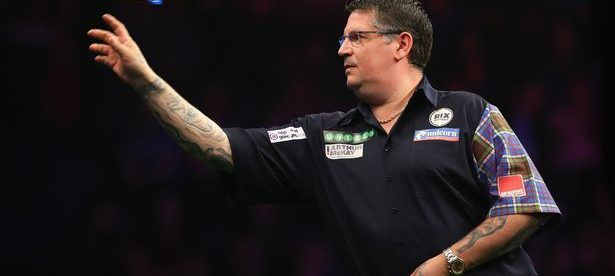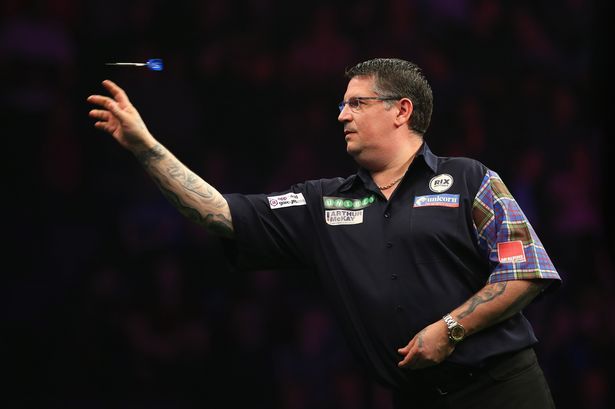Darts Darts Bo Barts Bananafana Fo… Uh Oh.


We typically think of darts — the game where you throw pointy sticks with tail wings at a circular board — as a game somewhat-drunk people play at a bar. But to some, dart throwing is a job. Competitive dart competitions most definitely exist, and in the UK in particular, the game is taken very seriously. For example, each year, the BBC broadcasts the British Darts Organization (BDO) World Championship, and fans of all ages can tune in for free to cheer on their favorite missile-throwers. And the BDO World Championships isn’t the only big money dart tournament — there are plenty of opportunities for a competitive darts player to earn a living.
But it’s hard to say that it’s not without controversy — if the 2018 Grand Slam of Darts was any indication.
This particular darts competition took place from November 10th to 18th in the city of Wolverhampton, England. Organized by the Professional Darts Corporation (PDC), a sanctioning body which rivals the BDO, it featured 32 of the world’s best competing for a £450,000 (about $600k) prize pool. In the final, Welsh dart thrower Gerwyn Price won his first ever major PDC title, beating Gary Anderson from Scotland. The match, though, was controversial. As the BBC reported, “Anderson took exception to what he viewed as slow play and over-exuberant celebrations by Price and the two clashed verbally on several occasions,” and at one point, the two had a minor physical altercation. Price earned a £21,500 ($28,000 and change) fine for “bringing the sport into disrepute” (and “gamesmanship”) and was suspended for three months; Anderson was given a formal reprimand for his behavior.
But that disagreement was rather tame compared to the one that brewed just a few days before.
With 16 men remaining in the draw, Anderson faced off against Dutchman Wesley Harms, a relative newcomer to the pro scene. In their first-to-ten knockout round, Anderson won 10-2 — that’s not a very good showing by Harms. Harms, though, didn’t blame himself. He blamed Anderson’s gastrointestinal system. In a post-match interview with Dutch TV station RTL7L, as relayed by the Guardian, Harms “said his poor form was due to Anderson breaking wind on stage and leaving a ‘fragrant smell’ behind. Harms continued: ‘It’ll take me two nights to lose this smell from my nose.’”
Anderson, unamused, tooted back. He told the press (again, via the Guardian) that “if the boy [Anderson] thinks I’ve farted he’s 1010% wrong. I swear on my children’s lives that it was not my fault. I had a bad stomach once on stage before and admitted it. So I’m not going to lie about farting on stage.” He even made a rather vile offer to anyone who was skeptical of his honesty; per VICE, he said “you can put your finger up my arse, there’ll be no smell there.”
Anderson didn’t deny that someone had stunk up the joint, though; he turned around and blamed Harms. Anderson described the stench as “a waft of rotten eggs” which permeated the area but originated near Harms’ position. But Anderson didn’t accuse his opponent of passing gas to order to divert Anderson’s attention. Rather, Anderson argued that Harms did so to improve his own game — Anderson stated that Harms “started to play better” after the flatulence episode, concluding that Harms “must have needed to get some wind out.”
We’ll never know the truth, but at least one group didn’t care — the PDC. The sanctioning body, despite the accusations (which most definitely brought the sport into disrepute), didn’t take any action. Harms took home £10,000 ($13,000) for his round of 16 exit; Anderson, as the tournament’s runner up, earned £55,000 ($72,500).
UPDATE 3/14/2019: Wait, we do know who tooted — and it wasn’t either player. It was a security guard.
Bonus fact: If you assume the goal of any dart thrower is to hit a bullseye, you’re wrong. In the most common variant, the goal is to score exactly 301 or 501 points (the former providing for a shorter match), and as a result, it makes sense to try to score as many points as possible, especially in earlier rounds. An outer bullseye is worth 25 points; an inner is worth 50. But there are more valuable spots. If you look at a dartboard (here’s a graphic), you’ll see a double ring and a triple ring, which double or triple (respectively) the point totals for that part of the wedge. The topmost part of the board is the triple-ring section of the 20-point wedge; landing your dart there earns you 60 points, which is ten points more than a bullseye (and as good as you can get).
From the Archives: A Mighty Wind: Putting the “art” in “fart.”
